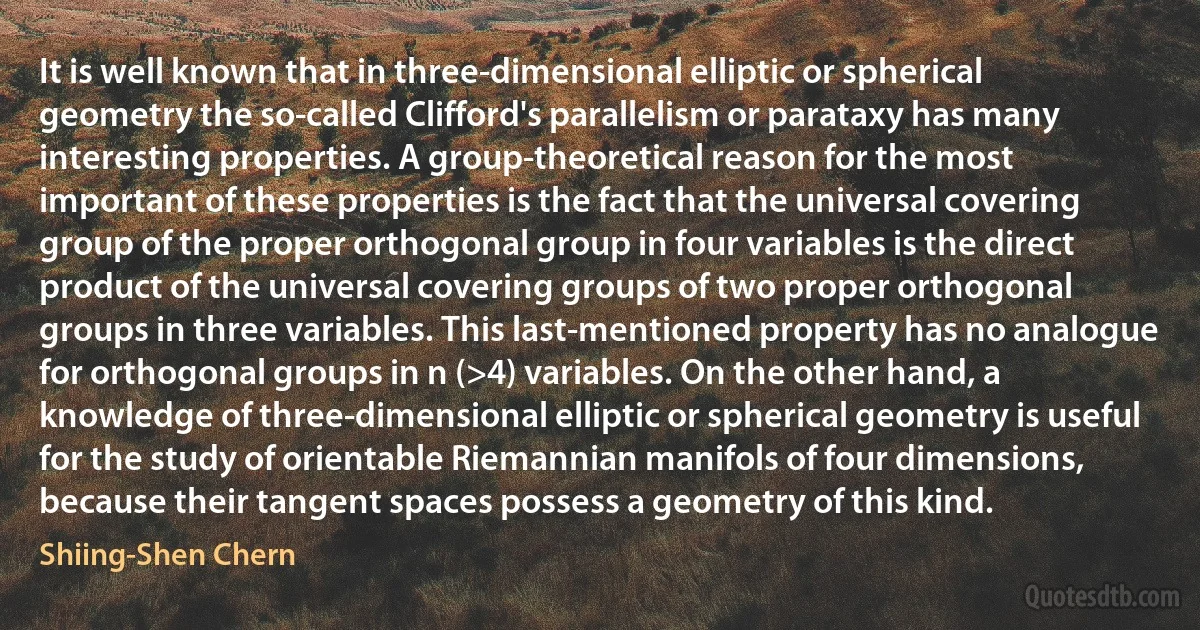
It is well known that in three-dimensional elliptic or spherical geometry the so-called Clifford's parallelism or parataxy has many interesting properties. A group-theoretical reason for the most important of these properties is the fact that the universal covering group of the proper orthogonal group in four variables is the direct product of the universal covering groups of two proper orthogonal groups in three variables. This last-mentioned property has no analogue for orthogonal groups in n (>4) variables. On the other hand, a knowledge of three-dimensional elliptic or spherical geometry is useful for the study of orientable Riemannian manifols of four dimensions, because their tangent spaces possess a geometry of this kind.
Shiing-Shen ChernRelated topics
analogue four geometry kind known knowledge orthogonal parallelism proper property reason study tangent three universal wellRelated quotes
[The Constructive idea.. ] has revealed a universal law that the elements of a visual art such as lines, colours, shapes, possess their own forces of expression independent of any association with the external aspects of the world; that their life and action are self-conditioned psychological phenomena rooted in human nature; that those elements are not chosen by convention by any utilitarian or other reason as words and figures are, they are not merely abstract signs, but they are immediately and organically bound up with human emotions. The revelation of this fundamental law has opened up a vast field in art giving the possibility of expression to those human impulses and emotions which have been neglected.

Naum Gabo
A common monetary standard will be established, with the consent of the various governments, by which industrial transactions will be greatly facilitated. Three spheres made respectively of gold, silver, and platinum, and each weighing fifty grammes, would differ sufficiently in value for the purpose. The sphere should have a small flattened base, and on the great circle parallel to it the Positivist motto would be inscribed. At the pole would be the image of the immortal Charlemagne, the founder of the Western Republic, and round the image his name would be engraved, in its Latin form, Carolus; that name, respected as it is by all nations of Europe alike, would be the common appellation of the universal monetary standard.

Auguste Comte
The gospel freely admitted makes a man happy. It gives him peace with God, and makes him happy in God. It gives to industry a noble, contented look which selfish drudgery never wore; and from the moment that a man begins to do his work for his Saviour's sake, he feels that the most ordinary employments are full of sweetness and dignity, and that the most difficult are not impossible. And if any of you, my friends, is weary with his work, if dissatisfaction with yourself or sorrow of any kind disheartens you, if at any time you feel the dull paralysis of conscious sin, or the depressing influence of vexing thoughts, look to Jesus, and be happy. Be happy, and your joyful work will prosper well.

William Wilberforce
An examination of the characteristics required by the employees and heads of undertakings of every kind leads to the same conclusions as the foregoing study, which was confined largely to industrial concerns. In the home and in affairs of State, the need for administrative ability is proportional to the importance of the undertaking. Like every other undertaking, the home requires administration, that is to say planning, organization, command, coordination and control. Nothing but a theory of administration, which can be taught and then discussed by everybody, can put an end to the general uncertainty as to proper methods, which exists in the isolation of our households. There is therefore a universal need for a knowledge of administration.

Henri Fayol
This education, therefore, results at the very outset in knowledge which transcends all experience, which is abstract, absolute, and strictly universal, and which includes within itself beforehand all subsequently possible experience. On the other hand, the old education was concerned, as a rule, only with the actual qualities of things as they are and as they should be believed and rioted, without anyone being able to assign a reason for them. It aimed, therefore, at purely passive reception by means of the power of memory, which was completely at the service of things. It was, therefore, impossible to have any idea of the mind as an independent original principle of things themselves.

Johann Gottlieb Fichte
